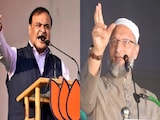In mid-July last year, Congress president Mallikarjun Kharge addressed a media conference after a two-day meeting of opposition parties concluding in Bengaluru, announcing the name of the new alliance. After months of aborted deliberations, it was finally named I.N.D.I.A., but the Congress President struggled to even pronounce its full name—Indian National Developmental Inclusive Alliance.
The Congress also struggled to explain why it had discarded the UPA (United Progressive Alliance), chaired by Sonia Gandhi, and why it felt the need to erase its own legacy. The question of who would lead the INDIA bloc, and whether there should be a convenor of the alliance, remained unresolved.
Congress's dismal performance in the Haryana, Jammu & Kashmir and Maharashtra assembly elections has made its claim to lead the INDIA bloc precarious. The leadership question has resurfaced to haunt both the Congress and the opposition coalition. Congress's de facto leader, Rahul Gandhi, has been fixated on a single issue, encouraging his MPs to disrupt both Houses of Parliament. The attempts at photo-ops every day with specially printed t-shirts, jackets, masks, and photos have further alienated some of the alliance's key partners—Mamata Banerjee's Trinamool Congress (TMC), Akhilesh Yadav's Samajwadi Party (SP), and Sharad Pawar's Nationalist Congress Party (NCP). And the list keeps growing.
The Samajwadi Party (SP) with 37 MPs and the TMC with 28 are two of the largest parties of the INDIA bloc. Sharad Pawar's NCP, with eight MPs, is also unhappy with the Congress's persistent negativity. Barely six months after the parliamentary election results were declared, there are already visible signs that the Congress is becoming isolated and that the INDIA bloc is starting to fall apart.
Mamata Banerjee's statement that she would be willing to lead the INDIA bloc if the Congress continues to fail in its responsibilities has sparked fresh debate. The Samajwadi Party (SP), the Sharad Pawar-led NCP, the Aam Aadmi Party (AAP), the Uddhav Thackeray-led Shiv Sena and the Rashtriya Janata Dal (RJD) have openly supported Mamata's candidature to lead the coalition.
Their disagreement and frustration with the Congress is coming to the fore. As per convention, each year, there are three parliamentary sessions: Budget, Monsoon, and Winter. While the government of the day awaits a parliamentary session to conduct legislative businesses, the opposition eagerly waits for a session to corner the government, raise issues of public concern, and utilize Question Hour, Zero Hour, and other fora to highlight specific topics.
Over the decades, we've seen that when the opposition disrupts or forces the washout of an entire session, the government succeeds in passing key legislative bills even amid the chaos. The real losers are the ordinary MPs, mostly from the opposition benches, who are deprived of the opportunity to raise issues affecting their constituencies and other matters of public concern.
Rahul Gandhi and Priyanka Gandhi's attempts to outmanoeuvre Akhilesh Yadav on the Sambhal issue have completely alienated the SP. The Congress remained silent on the Sambhal issue when the latter sought to raise it in Parliament. Rahul Gandhi and his party members chose to remain quiet when Akhilesh Yadav finally had an opportunity to address it in the Lok Sabha. But a day later, the siblings decided to drive to Sambhal from New Delhi, fully aware that they would not be allowed to go beyond the Delhi-UP border.
It was clear that this was meant to be a photo-op, designed for the Congress to send a message to a certain section of the electorate. Senior SP leaders responded harshly to this move. Akhilesh Yadav and Ram Gopal Yadav made uncharitable remarks about Rahul Gandhi. After all, it's a game of brinkmanship between the SP and the Congress over Muslim votes in Uttar Pradesh. There is also a growing realisation within the SP that the Congress's gains in the 2024 Parliamentary elections were largely due to the support of its own rank and file. The Congress's presence in Uttar Pradesh is otherwise marginal, with only two MLAs in the state assembly.
While Mamata Banerjee is part of the INDIA bloc, she has not entered into any electoral alliance with the Congress in either assembly or parliamentary polls. The Congress's presence in West Bengal is negligible.
It's true that India's polity has become largely bipolar. But it's also a fact that an alliance or coalition can sustain itself only when the party or leader holding the pole position has the capacity to win elections and adds value to its allies' prospects. The Congress seems to be faltering on this front.
(The author is Consulting Editor, NDTV)
Disclaimer: These are the personal opinions of the author















